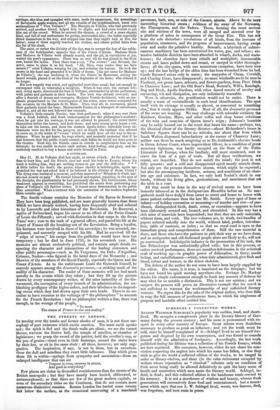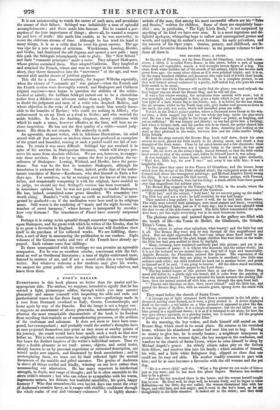SCHLEGEL S COLLECTED WORKS.
AUGUST WILHELM SCHLEGEL'S popularity was sudden, loud, and short- lived. He occupies a conspicuous place in the literary history of Ger• many during the present century ; and his name is pronounoed with re- spect in every other country of Europe. Great talents were doubtless necessary to produce so great an influence ; and yet the truth must be told, since he himself complained of it—Schlegel lived to see himself for= gotten and despised by his own countrymen, and was forced to console himself with the admiration of foreigners. Accordingly, the last work published during his lifetime was a collection of his French Essays, which are here reprinted. His executors, however, either do not share his con- viction respecting the neglect into which his name has fallen, or else they wish to give the world a collected edition of the works, to be ranged in order on library-shelves, and there (in the calm retirement occupied by writers whose reputation as " classical " subsists only on condition of their never being read) be allowed definitively to quit the busy scene of bustle and contention which men nathe the literary world. Schlegel, in- deed, is dead; and this collected edition is the handsome tomb erected to his memory. It is not a storehouse of wisdom and beauty, whence fresh generations will successively draw food and entertainment, but a monu- ment which says that one A. W. Schlegel lived, wrote, was famous, died, was forgotten, and here rests in peace.
It is not uninteresting to watch the career of such men, and scrutinize the causes of their failure. Schlegel was indubitably a man of splendid accomplishments ; and these made him famous. But he wanted a per- ception of the true importance of things ; above all, he wanted a respect for and love of truth ; this made him unable, as be was unworthy, to resist the oblivious stream of time. Although he has tried his hand at many things, it is as a critic that he owes his great success. The age was ripe for a new system of criticism. Winckleman, Leasing, Herder, and Giithe, had destroyed the old dogmas and opened a new path : upon this path the Schlegels triumphantly rode to glory. The "New School" and their "romantic principles" made a noise. They adopted Shakspere, whose genius sustained them. They adopted Calderon. They laughed at and attacked the French, whose star was no longer in the ascendant. In short, they threw themselves into the "movement " of the age, and were carried aloft amidst shouts of jubilant applause.
This did for a time. Unfortunately, for August Wilhelm especially, when the victory of "romantic art" was gained—when the French and the French system were thoroughly routed, and Shakspere and Calderon reigned supreme—men began to question the abilities of the critics. Looked at calmly, the brilliant Schlegel turned out to be a rhetorician -rather than a thinker—an advocate rather than a judge. People began to doubt the judgment and taste of a critic who despised Moliere, and whose objection to the rules of French tragedy made him utterly insen- sible to the beauties of Racine ; who could see nothing in Alfieri ; who 'endeavoured to set up Tieck as a rival to Gothe; and who worried the .noble Schiller. In fact, the dashing, eloquent, showy criticisms with 'which he made a name, however effective at the time, will bear no se- rious inspection. He has not the first quality of a critic—sound judg- ment. His dicta do not remain. His authority is null.
An agreeable, elegant writer, rich in felicitous illustrations, his mind stored with all that ancient or modern times have produced as exemplars 'of the grand and beautiful, coming at such a period could not fail of suc- cess. To retain it was more difficult. Schlegel has not retained it in spite of his services in Shaksperian literature, which will always pre- serve his name from absolute oblivion. We are not, however, to exagge- rate these services. He was by no means the first to proclaim the ex- cellences of Shakspere : Leasing, Wieland, and Herder, have the prece- dence. Nor was he the first to translate Shakspere, although his translation is reckoned the best. Some, indeed, prefer that of the unfor- tunate translator of Barns—Kaufmann, who shot himself in Paris a few days ago. For ourselves, as far as turning over the leaves of the trans- lation, and occasionally comparing it with the original, have enabled us to judge, we should say that Schlegel's version has been overrated. It is sometimes spirited, but he was not poet enough to render Shakspere. He has, indeed, committed some gross blunders. We remember two worth citing. Hamlet's "with wings as swift as meditation," is inter- preted by andacht—as if the meditation were here used in its religions sense. Still worse is the rendering of "music and the night become the touches of sweet harmony," where become is interpreted by 9verden: how very German! The translators of Faust have scarcely surpassed this.
Perhaps it is owing to his splendid though somewhat vague declamation upon Shakspere, and the gusto with which he writes of the Greeks, that he is so great a favourite in England. And this favour will doubtless show itself in the purchase of his collected works. We are fulfilling, there- fore, a sort of duty in announcing the publication to our readers. Eight volumes of the German works and two of the French have already ap- peared. Each volume costs four shillings.
To those unacquainted with his writings we can promise an agreeable companion. For he was an excellent scholar, conversant with the Ori- ental as well as Occidental literatures ; a man of highly-cultivated taste, learned in matters of art, and if not a sound critic yet a very brilliant writer. But whatever welcome a few students may give his works, we suspect the great public will place them upon library-shelves, and leave them there.



























 Previous page
Previous page